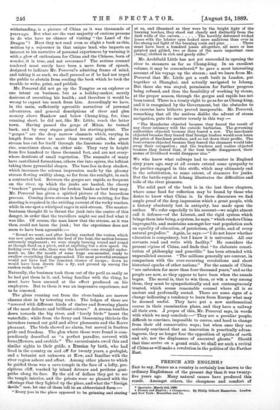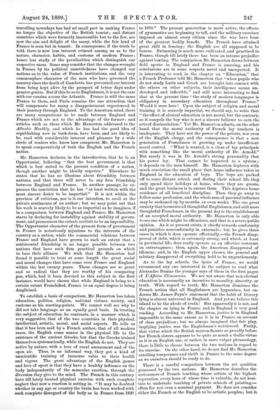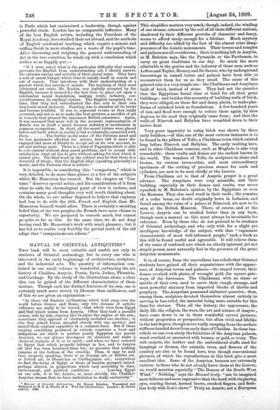FRENCH AND ENGLISH.f Sin to say, France as a country
is certainly less known to the ordinary Englishman of the present day than it was twenty- five years ago Many natural causes have produced this result. Amongst others, the cheapness and comfort of
• Spectator. March 3rd, issa
1- Preach and Ettg/ish a Comparison. By Philip Gilbert Hamerton. London and New York : Macmillan and Co. travelling nowadays has had nd small part in making France no longer the objective of the British tourist; and distant countries which were formerly inaccessible but to the few, are now the aim and delight of the many, while the fair land of France is seen but in transit. In consequence, if the truth be told, there is now less interest evinced among us as to the nature, character, habits, and customs of modern France; hence less study of the peculiarities which distinguish our respective races. Some may consider that the changes wrought in France by its political unsettledness have changed our notions as to the value of French institutions, and the very commonplace character of the men who have governed the country since the death of Gambetta has prevented our interest from being kept alive by the prospect of better days under greater genius. But if this be so to Englishmen, it is not the case with our cousins across the Atlantic. France is still the same France to them, and Paris remains the one attraction that will compensate for many a disappointment experienced in their journey through England. To the American mind, there are many comparisons to be made between England and France which are not to the advantage of the former ; and articles such as those which Mr. Hamerton addressed to the Atlantic Monthly, and which he has had the good idea of republishing now in book-form, have been, and are likely to be, read with considerable interest and pleasure by a wide circle of readers who know how competent Mr. Hamerton is to speak comparatively of both the English and the French nation.
Mr. Hamerton declares, in the introduction, that he is an Opportunist, believing " that the best government is that which is best suited to the present condition of a nation, though another might be ideally superior." Elsewhere he states that he has no illusions about friendship between nations, and that there will never be any firm friendship between England and France. In another passage, he ex- presses the conviction that he has " at least written with the most sincere desire to be impartial." It is not within the province of criticism, nor is it our intention, to cavil at the private sentiments of an author; but we may point out that his work is scarcely likely to be as impartial as he imagines, if in a comparison between England and France, Mr. Hamerton starts by declaring for instability against stability of govern- ment, and pronounces the entente cordiale to be an impossibility. The Opportunist character of the present form of government in France is notoriously injurious to the interests of the country as a nation, while the commercial relations between France and England have grown to such an extent that a sentimental friendship is no longer possible between two nations that have such firm practical grounds on which to base their alliance We wish that Mr. Hamerton had found it possible to treat at some length the great social and moral changes that have come over France and England within the last twenty years. Those changes are so great and so radical that they are worthy of his comparing pen, which, had it been devoted to this subject in the first instance, would have shown that while England is being to a certain extent Frenchified, France to an equal degree is being Anglicised.
To establish a basis of comparison, Mr. Hamerton has taken education, politics, religion, national virtues, society, and customs as his starting-points. We cannot well see why he did not take language as an equally good basis. In treating the subject of education, he contrasts, in a manner which is very suggestive, that of the two countries in their physical, intellectual, artistic, moral, and social aspects. He tells us that it has been said by a French author, that of all modern races, the English come nearer in the physical life to the existence of the ancient Greeks, but that the Greeks trained themselves systematically, while the English do not. They are active by nature, with a love of rural amusement and of the open air. Thus, in an informal way, they get a kind of unscientific training of immense value to their health and vigour. The great advantage of the English games and love of sport is that they have a healthy influence on the body independently of the muscular exertion, through the diversion they give to the mind. The FrenCh in this century have till lately treated physical exercise with such complete neglect that now a reaction is setting in. " It may be doubted whether in any age or country the brain has been worked with such complete disregard of the body as in France from 1830
to 1870." The present generation is more active, the effects of gymnastics are beginning to tell, and the military exercises imposed on almost every citizen since the war have been of the greatest bodily benefit. The French have attained great skill in fencing; the English are all supposed to be boxers. Swimming is much more cultivated and practised in France, though till lately there has been an intense prejudice against boating. The comparison Mr. Hamerton draws between field sports in England and France is amusing, and his conclusions are in some respects novel and unexpected. It is interesting to read, in the chapter on " Education," that a French Professor told Mr. Hamerton that "when pupils who do not study Latin and Greek are brought into contact with the others on other subjects, their intelligence seems un- developed and inflexible," and still more interesting to find that at the present time " the study of modern languages is obligatory in secondary education throughout France." Would it were here ! Upon the subject of religion and moral training it is scarcely impartial, we should say, to write that " the effect of clerical education is not moral, but the contrary, as it compels the boy who is not a sincere believer to earn the arts of dissimulation." Yet Mr. Hamerton admits, on the other hand, that the moral authority of French lay teachers is inadequate. They have not the power of the priests, nor even of the English clergy, and the consequence is that a new generation of Frenchmen is growing up under insufficient moral control. " What is wanted, is a class of lay principals with something like the moral authority of Dr. Arnold." But surely it was in Dr. Arnold's strong personality that his power lay. That cannot be imparted to a system ; it depends on the man himself. Mr. Hamerton deplores with much conviction the small place that home influence takes in England in the education of boys. The boys are packed off to some distant school, and during their school life they only spend their holidays at home, where they are guests, and the great business is to amuse them. This deprives home residence of all beneficial discipline. Then they go away to follow some profession, and the whole sum of parental influence may be reckoned up by months, or even weeks. The one great anxiety that torments all thoughtful Englishmen, and still more thoughtful Frenchmen, in the present day is the establishment of an accepted moral authority. Mr. Hamerton is only able to see one which might be efficacious, and that is a severe public opinion. As it at present exists, it chiefly rewards conformity and punishes nonconformity in externals ; but he gives three cases in which it does operate effectually,—the French disap- proval of debt, which is extremely strong, and which, at least in provincial life, does really operate as an effective restraint on extravagance; then, again, the American disapproval of idleness; and, in the English upper classes, the general and salutary disapproval of everything held to be ungentlemanly. As to the lay schools, the lyeees of France, we would recommend any one interested in the subject to read what Alexandre Dumas the younger says of them in the first pages of L'Agaire Clemenceau. We are not aware that non-clerical education is necessarily an incentive to morality, sincerity, or truth. With regard to truth, Mr. Hamerton dismisses the French notion that all Englishmen are hypocrites, but en- dorses Mr. James Payn's statement that the habit of literary lying is almost universal in England. And yet we believe this island to be the abode of truth! But apparently it is not, and
the chapter on lying in France and in England is very good reading. According to Mr. Hamerton, justice is in England impossible to the same extent as it is in France, on account of class prejudices ; but we always imagined that fair play, implying justice, was the Englishman's watchword. Purity, that virtue which the British matron flaunts so proudly before her French sisters, appears to be quite as much a Gallic virtue as it is an English one, or rather, in more vulgar phraseology,
there is little to choose between the two nations in regard to its exercise. On the other hand, we do not find Mr. Hamerton extolling temperance and thrift in France to the same degree as we ourselves should be ready to do.
There is a careful comparison between the art qualities possessed by the two nations. Mr. Hamerton describes the seriousness of French teaching, where artists of the highest reputation, every hour of whose time is valuable,• do not hesi- tate to undertake teaching of private schools of painting,— often for not even a nominal payment. He does not consider either the French or the English to be artistic peoples ; but it
is Paris which hall maintained a leadership, though against . powerful rivals. London has no comparable influence. Many of the best English artists, including the President of the Royal Academy, have studied their art abroad, and the methods of English academical teaching, which require a minute and trifling finish in mere studies, are a waste of the pupil's time. After discussing and weighing the general understanding of Art in the two countries, he winds up with a conclusion which strikes us as happily put :-
" If I were askel what is the particular difficulty that usually prevents the English from understanding art, I should answer, the extreme energy and activity of their moral sense. They have a sort of moral hunger which tries to satisfy itself in season and out of season. That interferes with their understanding of a pursuit which lies outside of morals. The teaching of their most celebrated art critic, Mr. Ruskin, was joyfully accepted by the English, because it seemed for the first time to place art upon a substantial moral foundation, making truth, industry, con- scientiousness, its cardinal virtues. The English imagined, for a time, that they had subordinated the fine arts to their own dominant moral instincts. Painting was to abandon all its tricks and become truthful. It was to represent events as they really occurred, and not so as to make the best pictures, a sacrifice of art to veracity that pleased the innermost British conscience. Again, it was assumed that mere toil in the accurate representation of details was in itself a merit, because industry is meritorious in common occupations. In short, all the moral virtues were placed before art itself, which in reality is but accidentally connected with them The feebler moral sense of the Parisian mind and its less passionate affection for nature, have left it more dis- engaged and more at liberty to accept art on its own account, as art and nothing more. There is a kind of Paganism which is able to rest content without deep moral problems, and to accept with satisfaction what art has to give without asking for that which it cannot give. The final word on the subject may be that there is a diversity of ideals ; that the English ideal (speaking generally) is moral, and the Parisian ideal is artistic."
It is impossible, in considering this "comparison," which is very detailed, to do more than glance at a few of the subjects which Mr. Hamerton has treated. But the chapter on " Cus- toms " deserves special notice, and his consideration of it from what he calls the chronological point of view is curious, and contains many good thoughts very well worth thinking about. On the whole, we are rather disposed to believe that euphony had less to do with the title, French and English, than Mr. Hamerton himself would allow. There is certainly a sneaking belief that, of the two peoples, the French have more claims to superiority. We are prepared to concede much, but cannot go quite so far as this. At the same time, we do not deny having read Mr. Hamerton's work with much pleasure; but it has led us to realise very forcibly the partial truth of the old adage that " comparisons are odious."




































 Previous page
Previous page